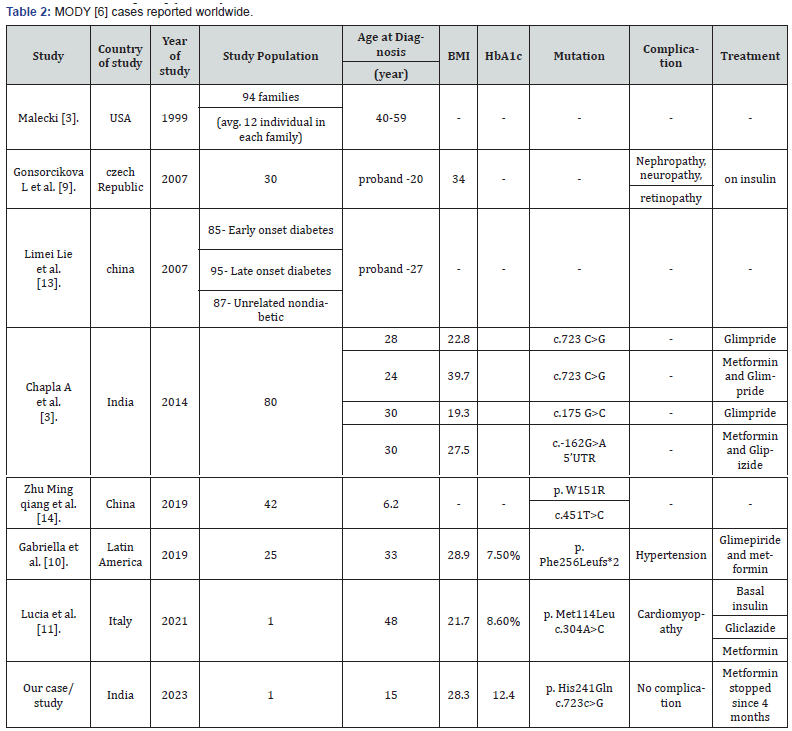Diabetes & Obesity - Juniper Publishers
Abstract
MODY( Maturity onset diabetes of young) is a rare monogenic type of diabetes and which comprises 1-5 % of all diabetes cases [1]. It is often misdiagnosed as either type 1 or type 2 diabetes mellitus in children and adolescents due to common clinical signs and symptoms. With the availability of genetic testing, an increasing number of cases of MODY are being reported. We are reporting a case of 15 years old male child who presented with hyperglycemia without metabolic acidosis. He started on standard insulin regimen in view of suspected type1 diabetes. Later he was detected with NEUROD1 mutation, which is associated with MODY6, and the child was put on oral hypoglycemic drug, Metformin. At present the child is not on medication and is euglycemic. NEUROD1 is one of the least reported mutations in MODY6, only 5-6 cases are reported from India, and we report the youngest case.
Keywords: MODY6; NEUROD1; Diabetes; Adolescent
Abbreviation: MODY: Maturity Onset Diabetes of Young; NEUROD1: Neuronal Differentiation factor 1; HESC: Human embryonic stem cells; bHLH: Basic Helix-Loop-Helix
Introduction
MODY: Is a rare monogenic type of diabetes involving single gene mutations which comprises 1-5 % of all diabetes cases [1,2]. It can be inherited as autosomal dominant, autosomal recessive or de novo, and based on gene involved MODY is classified into 11 subtypes. Mutation in NEUROD1 is the least reported form of MODY (2).
Neurogenic differentiation 1 (NEUROD1) is a transcription factor necessary for the development of pancreatic islets and insulin secretion [5]. NEUROD1 heterodimerizes with basic helix–loop–helix factor E47 to form a complex named insulin enhancer factor 1 which acts as a transcription factor of insulin gene [6]. NEUROD1 inactivation in HESCs severely impaired their differentiation from pancreatic progenitors into insulin expressing cells [7].
MODY6 usually presents before 25 years of age with hyperglycemia while ketoacidosis is rare. Other associations in NEUROD1 gene mutation reported are abnormality of cerebellar function, mental disability, hippocampal hypoplasia, hearing loss and epilepsy [8]. We report the youngest case of MODY6 reported from India maintaining normal blood glucose levels without any medication which is an unusual presentation with monogenic diabetes.
Case Presentation
15yrs old male child was referred to the hospital with history of polyuria and polydipsia for 1 week and glycosuria. On examination acanthosis nigricans was present, his weight was 60.9kg, height 168cms and BMI 28.34kg/m2. On investigating his random blood glucose level was 470mg/dl, HbA1C 12.4%, fasting blood glucose level 307mg/dl and postprandial glucose level was 483mg/dl, blood gas study was normal. Child’s GAD65 was negative, C peptide- 3.43 ng/ml , TSH- 1.33 micro IU /ml were negative (Table 1).
His father and grandmother also have type 2 diabetes, diagnosed at the age of 35 years and 40 years respectively. Both are on oral hypoglycemic therapy and maintain normal blood glucose levels. Child was started on basal bolus regimen with insulin Degludec and insulin Lispro. His blood glucose level normalized within 2-3 weeks of starting on basal bolus regimen. He started having postprandial hypoglycemia therefore bolus insulin was stopped. Insulin requirement declined rapidly, so insulin was stopped and switched to oral hypoglycemic agent (Metformin). Genetic study was also sent. 6 months later metformin tapered gradually and stopped because of persistent low postprandial glucose level levels. Genetic sequencing reported a heterozygous missense mutation in exon 2 of NEUROD1 gene with autosomal dominant inheritance. He had no other clinical features associated with NEUROD1 gene mutation. On regular follow up his cardiac evaluation and neurological examination remained normal, and he is maintaining normal blood glucose level with HbA1C value of 5.6%. Liver function test, renal function test and C-peptide were normal.

Discussion
MODY: Is monogenic diabetes which is inherited in families and the common presentation is hyperglycemia which may or may not be associated with diabetic ketoacidosis. Based on the underlying mutation it is classified into 11 subtypes. The first to report association between NEUROD1 mutation and type 2 diabetes was done by Malecki et al. [3]. In 1999. With the advent of newer technologies in genetic testing, reporting of MODY6 has increased worldwide [9-14] (Table 2).

Majority of reported cases of MODY6 were diagnosed between 30 - 40years of age, mostly misdiagnosed as other types of diabetes, we are reporting one of the youngest cases diagnosed with MODY6 at 15 years of age with NEUROD1, p. his241Gln c.723 C>G heterozygous mutation. Gonosorcikova et al. [9]. reported nephropathy, neuropathy, and retinopathy as complications of MODY6. Gabriella et al. [10]. reported hypertension and one of recent study by Lucia et al. [11]. published a case of NEUROD1 who developed cardiomyopathy. Our patient had no known associated complication of MODY6 till the most recent follow up.
Aaron C et al. [12]. from India reported 4 patients with NEUROD1 mutation, between the age group of 25-30 years and all of them were on one or more oral hypoglycemic drug treatment. Patients with MODY require sulfonylureas to maintain normal blood glucose level but our case is maintaining blood glucose level in normal range without any medications, which has not been reported previously.
Conclusion
MODY should be suspected in Cases with Hyperglycemia; negative antibodies and strong family history and genetic testing should be undertaken in these cases as the most cases respond to oral medications than insulin. There are very few cases of MODY1 cases especially with NEUROD1 mutation reported worldwide, and more data needs to be available to understand the course of the disease.
To Know more about Current Research in Diabetes & Obesity Journal
Click here: https://juniperpublishers.com/crdoj/index.php
To Know more about our Juniper Publishers




No comments:
Post a Comment